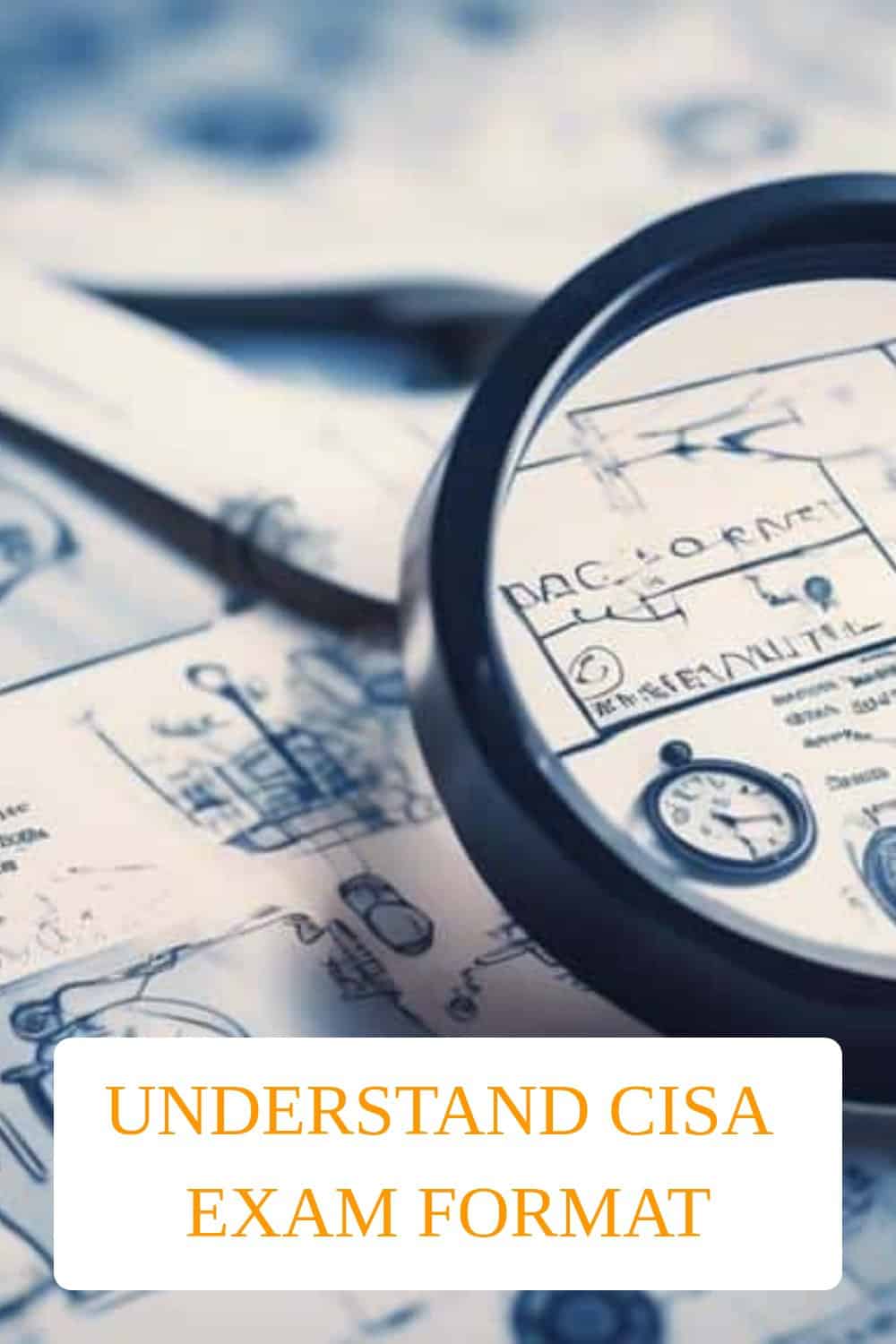'Knowledge is power,' as the old saying goes, and this couldn't be truer when it comes to understanding the format of the Certified Information Systems Auditor (CISA) exam.
You're required to answer 150 multiple-choice questions within a strict four-hour timeframe, covering five distinct job practice domains.
It's not just about knowing the content, but also how the test itself works. Understanding the structure and scoring system, the types of questions you'll encounter, and the importance of each domain can help you devise an effective strategy for tackling the exam.
But there's more to it than meets the eye, isn't there?
Key Takeaways
- The CISA exam consists of 150 multiple-choice questions.
- The exam covers five distinct job practice domains.
- Raw scores are converted to a scaled score between 200-800.
- Thorough understanding of each domain's content is crucial for success.
Understanding the CISA Exam Structure
To fully grasp the structure of the CISA exam, it's crucial to understand that it's composed of 150 multiple-choice questions, covering diverse domains such as Information Systems Auditing and Governance and Management of IT. This Certified Information Systems Auditor (CISA) certification, governed by ISACA, demands a keen understanding of various ISACA CISA domains.
You'll need a strategic study plan that includes practicing CISA exam questions to familiarize yourself with the exam's content and format. Your preparation shouldn't be haphazard, but rather, systematic and comprehensive. It's not about cramming information, but understanding and applying concepts.
Scoring is another vital aspect you should be aware of. While the exact passing score isn't disclosed by ISACA, you'll generally need at least 450 out of 800 to pass the CISA exam. This score may vary with each administration, so it's essential not to rely solely on a specific score but rather aim for a solid understanding of all domains.
Time management is a skill you'll need to master. Why? Because freedom comes with responsibility. The liberty to manage your study time as you wish demands discipline and focus. Your ultimate goal? To pass the CISA exam and earn your CISA certification.
Decoding the Scoring System
Let's decode the CISA exam scoring system.
It's crucial for you to comprehend both the raw scores and how they're converted.
This understanding won't only clarify your performance but also help you strategize your approach for future attempts.
Understanding Raw Scores
Diving into the heart of CISA exam scoring, you'll find that understanding raw scores can be a critical key to unlock the intricacies of this complex system.
- Raw scores represent the number of questions you answer correctly in the CISA exam. They're a reflection of your EXAM PREP and study time.
- To prepare for the CISA, you'll need to understand the CISA syllabus and raw score calculation.
- CISA certified professionals often recommend using study guides and practice exams to familiarize yourself with the certification exam format.
- Remember, it's not just about passing the exam, but truly understanding the CISA exam format to ensure you're thoroughly prepared.
In essence, your raw score can be a valuable gauge of your readiness to become CISA certified.
Interpreting Converted Scores
Now, you're ready to delve into the concept of interpreting converted scores, a crucial aspect of understanding the CISA scoring system.
Knowing the exam format is imperative before you take the exam. The Information Systems Auditor (CISA) exam consists of 150 questions, each contributing to your raw score. This score is then scaled between 200-800, with 450 being the pass mark.
Interpreting converted scores helps you understand the weightage of each domain in the CISA exam. It's important to study the Review Manual thoroughly, focusing on the job practice areas.
Types of Questions Encountered
In the CISA exam, you'll encounter 150 multiple-choice questions that span diverse domains such as Information Systems Auditing and Governance and Management of IT, each carrying varying weightage in terms of marks. These questions test your knowledge and understanding of these domains while challenging your analytical and decision-making skills.
To prepare for the ISACA, you'll need to focus on four main areas:
- Thoroughly understand and internalize the content of each domain. The depth of INFORMATION SYSTEMS AUDITING and Governance and Management of IT can't be underestimated.
- Familiarize yourself with the exam format. This helps you know what to expect, reducing anxiety and boosting confidence.
- Practice, practice, practice. Repeated exposure to exam-like questions builds familiarity and improves time management. Utilize the 96 hours of study time effectively.
- Engage with the ISACA community. Learning from others' experiences provides valuable insights and tips.
Examination Duration Details
Having covered the different types of questions and key preparation strategies, let's shift our focus to the specifics of the exam duration and the time investment required for efficient preparation.
The CISA examination duration details reveal that the test typically spans four hours. In this time, you're required to answer 150 multiple-choice questions.
The duration might seem long, but considering the scope of knowledge and skills tested, it's quite reasonable. Topics range from Audit Standards to Internal audit procedures, and more. Your work experience in these areas will undoubtedly be beneficial during the exam.
Preparation, however, can take anywhere from three to four months. It's advisable to dedicate around two to three hours daily to adequately prepare. The time can fluctuate depending on your prior understanding of the concepts.
Involving yourself in Study Groups can be a game-changer. Besides offering moral support, they provide a platform for you to discuss challenging topics, share resources, and even simulate exam conditions. This experience can help you prepare effectively for the CISA exam by honing your comprehension and reducing your study time.
Deep-Dive Into Exam Sections
Let's dive deep into the various sections of the CISA exam, each designed to assess your knowledge and skills in five job practice domains, including key areas like information systems auditing, governance, and more. This deep-dive into exam sections offers an insightful overview of the CISA exam format, allowing you to effectively tailor your study approach and audit strategy.
- Information Systems Auditing Process (21%): This domain assesses your capability to implement systems audit and control and requires a robust understanding of the Code of Professional Ethics.
- Governance and Management of IT (17%): Here, you'll need a comprehensive grasp of strategic management practices and risk management.
- Information Systems Acquisition, Development, and Implementation (12%): This section requires knowledge of project management principles and software development methodologies.
- Information Systems Operations and Business Resilience (23%): Tests your skills in IT service delivery and support, and disaster recovery.
Preparation Strategies for CISA
To ace the CISA exam, you'll need to get a firm grasp of its structure, which consists of 150 multiple-choice questions covering distinct domains such as Information Systems Auditing, Governance and Management of IT, and more. Each question requires a keen understanding of various aspects, including INFORMATION SYSTEMS OPERATIONS, Information Security Management, and project management.
Efficient time management is crucial. You must allocate appropriate time for each section based on its difficulty level. This strategy ensures you optimize the four-hour exam duration, without missing out on any question.
In your quest for certification, utilize study resources such as textbooks, online courses, and practice exams specifically designed for the CISA exam. These resources provide a comprehensive understanding of the subject, honing your knowledge about business systems, best practices, and organizations' strategies.
Engage with study groups or forums to share knowledge and gain different perspectives. It's a proven method to reinforce your understanding and identify areas for improvement.
Lastly, abide by the guidelines and coursebooks provided by ISACA. Their resources are invaluable for acing this exam. A systematic and detail-oriented preparation strategy is your ticket to success in the CISA exam.
Importance of Mock Examinations
As you delve deeper into your CISA exam preparation, don't overlook the importance of mock examinations; they serve as a powerful tool for simulating the actual exam environment and greatly reducing test-day anxiety. They're not just practice tests; they're a means to understand the CISA exam format and gauge your grasp of topics like the Auditing Process, Development and Implementation, data classification, logical security controls, and the protection of information assets.
- Identify Weak Areas: Mock exams help you discern which areas, such as incident management or governance structure, you need to focus on.
- Familiarize with Question Style: You'll get accustomed to the question format, reducing surprises on the exam day.
- Time Management: They give you a real-time experience of managing your time effectively during the actual exam.
- Measure Progress: Regular mock exams allow you to track your progress and implement necessary process improvements.
Frequently Asked Questions
How Is the CISA Exam Structured?
You're tackling the CISA exam, right? Its structure involves 150 multiple-choice questions, spanning areas such as IT Governance and Information Systems Auditing.
Each question gives you four options, but only one's correct! Remember, not all questions have the same value.
You're aiming for at least 450 out of 800 to pass. It's a challenge, but with the right preparation, you'll conquer it.
Good luck!
How Many Questions Do I Need to Get Right on CISA Exam?
You're probably thinking, 'How many answers do I need to nail to pass the CISA exam?' Well, it's not that simple.
The CISA uses a mysterious, undisclosed scoring model. Not all questions are created equal, some carry more weight than others. So, it's not just about getting a certain number right, it's about acing the heavier ones.
Aim for a score of at least 450 out of 800, but remember, every question counts!
How Does the CISA Exam Work?
You're looking at a four-hour exam with 150 multiple-choice questions.
It's not just about answering correctly, you need a score of 450 or more out of 800 to pass.
Questions vary in weight, so some count more than others.
ISACA offers study materials to help you prep.
It's a tough test, but with proper preparation, you're capable of acing it.
How Many Parts Is the CISA Exam?
You're probably wondering about the structure of the CISA exam. It's divided into five parts, or domains. Each one focuses on a different aspect of information systems auditing and governance. So, you'll be tested on a wide range of skills and knowledge.
It's important to understand each domain, as they all contribute to your overall score. So, don't skip any parts while studying!
Conclusion
So, you've got the lowdown on the CISA exam format. It's clear as mud, right? Don't sweat it. Remember, it's a marathon, not a sprint.
Dive deep into Domains 4 and 5, and don't underestimate the power of mock exams. With thoughtful preparation strategies, you've got this in the bag.
Remember, knowledge is power, and you're just 150 questions away from showcasing yours. Go get 'em, tiger!CISA) certification, governed by ISACA, demands a keen understanding of various ISACA CISA domains.he Certified Information Systems Auditor (CISA) exam.
You're required to answer 150 multiple-choice questions within a strict four-hour timeframe, covering five distinct job practice domains.
It's not just about knowing the content, but also how the test itself works. Understanding the structure and scoring system, the types of questions you'll encounter, and the importance of each domain can help you devise an effective strategy for tackling the exam.
But there's more to it than meets the eye, isn't there?
Key Takeaways
- The CISA exam consists of 150 multiple-choice questions.
- The exam covers five distinct job practice domains.
- Raw scores are converted to a scaled score between 200-800.
- Thorough understanding of each domain's content is crucial for success.
Understanding the CISA Exam Structure
To fully grasp the structure of the CISA exam, it's crucial to understand that it's composed of 150 multiple-choice questions, covering diverse domains such as Information Systems Auditing and Governance and Management of IT. This Certified Information Systems Auditor (CISA) certification, governed by ISACA, demands a keen understanding of various ISACA CISA domains.
You'll need a strategic study plan that includes practicing CISA exam questions to familiarize yourself with the exam's content and format. Your preparation shouldn't be haphazard, but rather, systematic and comprehensive. It's not about cramming information, but understanding and applying concepts.
Scoring is another vital aspect you should be aware of. While the exact passing score isn't disclosed by ISACA, you'll generally need at least 450 out of 800 to pass the CISA exam. This score may vary with each administration, so it's essential not to rely solely on a specific score but rather aim for a solid understanding of all domains.
Time management is a skill you'll need to master. Why? Because freedom comes with responsibility. The liberty to manage your study time as you wish demands discipline and focus. Your ultimate goal? To pass the CISA exam and earn your CISA certification.
Decoding the Scoring System
Let's decode the CISA exam scoring system.
It's crucial for you to comprehend both the raw scores and how they're converted.
This understanding won't only clarify your performance but also help you strategize your approach for future attempts.
Understanding Raw Scores
Diving into the heart of CISA exam scoring, you'll find that understanding raw scores can be a critical key to unlock the intricacies of this complex system.
- Raw scores represent the number of questions you answer correctly in the CISA exam. They're a reflection of your EXAM PREP and study time.
- To prepare for the CISA, you'll need to understand the CISA syllabus and raw score calculation.
- CISA certified professionals often recommend using study guides and practice exams to familiarize yourself with the certification exam format.
- Remember, it's not just about passing the exam, but truly understanding the CISA exam format to ensure you're thoroughly prepared.
In essence, your raw score can be a valuable gauge of your readiness to become CISA certified.
Interpreting Converted Scores
Now, you're ready to delve into the concept of interpreting converted scores, a crucial aspect of understanding the CISA scoring system.
Knowing the exam format is imperative before you take the exam. The Information Systems Auditor (CISA) exam consists of 150 questions, each contributing to your raw score. This score is then scaled between 200-800, with 450 being the pass mark.
Interpreting converted scores helps you understand the weightage of each domain in the CISA exam. It's important to study the Review Manual thoroughly, focusing on the job practice areas.
Types of Questions Encountered
In the CISA exam, you'll encounter 150 multiple-choice questions that span diverse domains such as Information Systems Auditing and Governance and Management of IT, each carrying varying weightage in terms of marks. These questions test your knowledge and understanding of these domains while challenging your analytical and decision-making skills.
To prepare for the ISACA, you'll need to focus on four main areas:
- Thoroughly understand and internalize the content of each domain. The depth of INFORMATION SYSTEMS AUDITING and Governance and Management of IT can't be underestimated.
- Familiarize yourself with the exam format. This helps you know what to expect, reducing anxiety and boosting confidence.
- Practice, practice, practice. Repeated exposure to exam-like questions builds familiarity and improves time management. Utilize the 96 hours of study time effectively.
- Engage with the ISACA community. Learning from others' experiences provides valuable insights and tips.
Examination Duration Details
Having covered the different types of questions and key preparation strategies, let's shift our focus to the specifics of the exam duration and the time investment required for efficient preparation.
The CISA examination duration details reveal that the test typically spans four hours. In this time, you're required to answer 150 multiple-choice questions.
The duration might seem long, but considering the scope of knowledge and skills tested, it's quite reasonable. Topics range from Audit Standards to Internal audit procedures, and more. Your work experience in these areas will undoubtedly be beneficial during the exam.
Preparation, however, can take anywhere from three to four months. It's advisable to dedicate around two to three hours daily to adequately prepare. The time can fluctuate depending on your prior understanding of the concepts.
Involving yourself in Study Groups can be a game-changer. Besides offering moral support, they provide a platform for you to discuss challenging topics, share resources, and even simulate exam conditions. This experience can help you prepare effectively for the CISA exam by honing your comprehension and reducing your study time.
Deep-Dive Into Exam Sections
Let's dive deep into the various sections of the CISA exam, each designed to assess your knowledge and skills in five job practice domains, including key areas like information systems auditing, governance, and more. This deep-dive into exam sections offers an insightful overview of the CISA exam format, allowing you to effectively tailor your study approach and audit strategy.
- Information Systems Auditing Process (21%): This domain assesses your capability to implement systems audit and control and requires a robust understanding of the Code of Professional Ethics.
- Governance and Management of IT (17%): Here, you'll need a comprehensive grasp of strategic management practices and risk management.
- Information Systems Acquisition, Development, and Implementation (12%): This section requires knowledge of project management principles and software development methodologies.
- Information Systems Operations and Business Resilience (23%): Tests your skills in IT service delivery and support, and disaster recovery.
Preparation Strategies for CISA
To ace the CISA exam, you'll need to get a firm grasp of its structure, which consists of 150 multiple-choice questions covering distinct domains such as Information Systems Auditing, Governance and Management of IT, and more. Each question requires a keen understanding of various aspects, including INFORMATION SYSTEMS OPERATIONS, Information Security Management, and project management.
Efficient time management is crucial. You must allocate appropriate time for each section based on its difficulty level. This strategy ensures you optimize the four-hour exam duration, without missing out on any question.
In your quest for certification, utilize study resources such as textbooks, online courses, and practice exams specifically designed for the CISA exam. These resources provide a comprehensive understanding of the subject, honing your knowledge about business systems, best practices, and organizations' strategies.
Engage with study groups or forums to share knowledge and gain different perspectives. It's a proven method to reinforce your understanding and identify areas for improvement.
Lastly, abide by the guidelines and coursebooks provided by ISACA. Their resources are invaluable for acing this exam. A systematic and detail-oriented preparation strategy is your ticket to success in the CISA exam.
Importance of Mock Examinations
As you delve deeper into your CISA exam preparation, don't overlook the importance of mock examinations; they serve as a powerful tool for simulating the actual exam environment and greatly reducing test-day anxiety. They're not just practice tests; they're a means to understand the CISA exam format and gauge your grasp of topics like the Auditing Process, Development and Implementation, data classification, logical security controls, and the protection of information assets.
- Identify Weak Areas: Mock exams help you discern which areas, such as incident management or governance structure, you need to focus on.
- Familiarize with Question Style: You'll get accustomed to the question format, reducing surprises on the exam day.
- Time Management: They give you a real-time experience of managing your time effectively during the actual exam.
- Measure Progress: Regular mock exams allow you to track your progress and implement necessary process improvements.
Frequently Asked Questions
How Is the CISA Exam Structured?
You're tackling the CISA exam, right? Its structure involves 150 multiple-choice questions, spanning areas such as IT Governance and Information Systems Auditing.
Each question gives you four options, but only one's correct! Remember, not all questions have the same value.
You're aiming for at least 450 out of 800 to pass. It's a challenge, but with the right preparation, you'll conquer it.
Good luck!
How Many Questions Do I Need to Get Right on CISA Exam?
You're probably thinking, 'How many answers do I need to nail to pass the CISA exam?' Well, it's not that simple.
The CISA uses a mysterious, undisclosed scoring model. Not all questions are created equal, some carry more weight than others. So, it's not just about getting a certain number right, it's about acing the heavier ones.
Aim for a score of at least 450 out of 800, but remember, every question counts!
How Does the CISA Exam Work?
You're looking at a four-hour exam with 150 multiple-choice questions.
It's not just about answering correctly, you need a score of 450 or more out of 800 to pass.
Questions vary in weight, so some count more than others.
ISACA offers study materials to help you prep.
It's a tough test, but with proper preparation, you're capable of acing it.
How Many Parts Is the CISA Exam?
You're probably wondering about the structure of the CISA exam. It's divided into five parts, or domains. Each one focuses on a different aspect of information systems auditing and governance. So, you'll be tested on a wide range of skills and knowledge.
It's important to understand each domain, as they all contribute to your overall score. So, don't skip any parts while studying!
Conclusion
So, you've got the lowdown on the CISA exam format. It's clear as mud, right? Don't sweat it. Remember, it's a marathon, not a sprint.
Dive deep into Domains 4 and 5, and don't underestimate the power of mock exams. With thoughtful preparation strategies, you've got this in the bag.
Remember, knowledge is power, and you're just 150 questions away from showcasing yours. Go get 'em, tiger!









